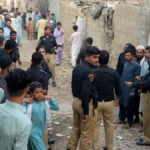
Since August 15, 2021, when the Taliban forcefully entered Kabul and established a totalitarian regime, Afghanistan has witnessed one of the most profound socio-political and humanitarian declines in recent history. While international attention often focuses on the humanitarian crisis, the gender apartheid regime imposed by the Taliban has especially devastated Afghan women and girls—stripping them of all basic rights, freedoms, and dignities.
Key Impacts on Afghan Society:
• Gender Apartheid:
Women are completely erased from public life. They are banned from schools, universities, workplaces, public parks, gyms, political participation, and even access to justice. Their freedom of movement is severely restricted. The Taliban’s so-called Ministry for the Propagation of Virtue and Prevention of Vice enforces these bans through public surveillance and punishment.
• Humanitarian Catastrophe:
According to the UN, 95% of the population lacks sufficient food, with 28 million people facing starvation. Women-headed households are disproportionately impacted due to systemic exclusion and poverty.
• Collapse of Education System:
Girls beyond grade six are banned from school. Universities are closed to women. Thousands of female educators and students have been pushed into silence or exile.
• Disappearance of the Judiciary and Rule of Law:
Afghanistan no longer has a functioning legal system. The formal judiciary has collapsed. Taliban clerics now issue arbitrary rulings, and women have no legal recourse in cases of violence, divorce, or property claims.
• Destruction of Media and Free Expression:
Over 80% of independent media outlets have shut down. Journalists face threats, torture, imprisonment, or exile. Reporting on the realities of life under the Taliban is criminalized.
• Crackdown on Civil Society:
Civil society organizations, especially those led by or serving women, have been shut down or forced to operate in hiding. Activists face daily threats, harassment, or forced disappearances.
• Exclusionary and Illegitimate Governance:
The Taliban government remains non-inclusive, composed solely of Taliban members—all male and primarily Pashtun. There is no constitution, no elections, and no mechanisms for public participation or accountability.
• Health System on the Brink of Collapse:
Due to lack of funding, women’s access to reproductive and maternal health services is deteriorating. Female healthcare workers are restricted, and rural health centers have closed.
• Rising Poverty and Economic Meltdown:
With women banned from working and banking systems disrupted, the country faces mass unemployment, widespread poverty, and a collapsing private sector.
• Mass Migration and Displacement:
Millions have fled the country or are internally displaced, especially women activists, journalists, former government workers, and ethnic or religious minorities.
• Surge in Terrorism and Extremism:
Afghanistan has become a safe haven for extremist groups, including ISIS-K and Al-Qaeda. This creates a regional and global security threat.
• Ethnic and Religious Persecution:
Systematic discrimination, displacement, and targeted attacks against Hazaras, Shias, Sikhs, Hindus, and other minorities have escalated. The Taliban continues its policy of cultural and demographic engineering.
• Cultural Destruction:
Taliban authorities have banned music, arts, entertainment, and many cultural expressions—seeking to erase Afghanistan’s pluralistic identity.



